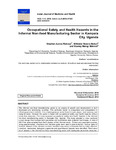Occupational Safety and Health Hazards in the Informal Non-food Manufacturing Sector in Kampala City, Uganda

View/
Date
2019Author
Wekoye, Stephen Aurice
Moturi, Wilkister Nyaora
Makindi, Stanley Maingi
Metadata
Show full item recordAbstract
The informal non-food manufacturing sector is an engine of growth and development in both developed and developing countries. This particular sector is unregulated and unregistered in official government statistics. It is a heterogeneous sector found in open places, road reserves and marginal lands. However the sector is faced with occupational safety and health hazards without preventive measures. The study assessed occupational safety and health hazards in the informal non-food manufacturing sector in Kampala City, Uganda. The study adopted a cross sectional survey design that involved both qualitative and quantitative data collection techniques. A total of 424 firms were sampled from the 6 clusters of the informal sector. Primary and secondary sources using questionnaires, checklists and interview guide were used in data collection. Various types of hazards inherent in the informal non-food manufacturing sector in Kampala that included; physical, chemical, mechanical, biological, ergonomic and psycho social hazards were identified. There are a lot of hazards in the informal non-food manufacturing sector with inadequate preventive measures.
Hence the urgent need to address the situation by creation of awareness, training, and provision of OSH regulations, inspection and enforcement by the relevant regulatory agency as well as proactive multi-media strategies to improve the situation.
